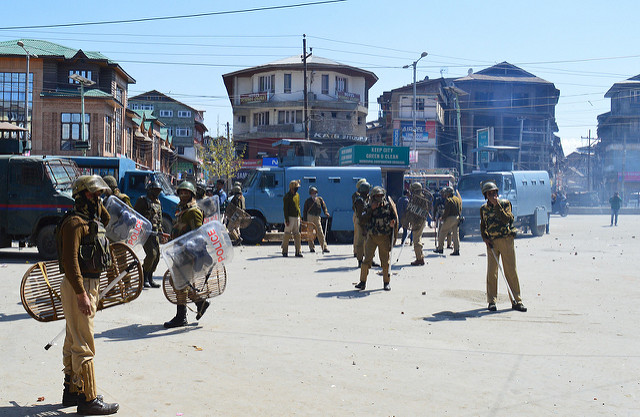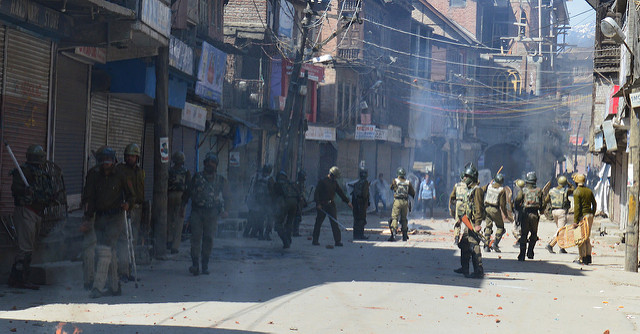
By Gowhar Fazili
While we must all defend the right to free speech regardless of the politics of people involved and condemn ABVP’s latest assault on the seminar on ‘The Cultures of Dissent’ in Ramjas college unequivocally, there is yet another reality that stares us in the face—the remarkable ease with which the academia, political activists and institutions in India bend over backwards to surrender before the right wing assault on free speech. Predictably, as was the case earlier in JNU as well, in wake of the Ramjas assault, one defender of free speech after another is backtracking on the freedom to speak of and for what has been actually forbidden—speech related to ongoing struggle for azadi in Kashmir. Not only do such academics and intellectuals readily compromise with and surrender before fascism by disinviting people and cancelling critical discursive events in wake of what have now become insipidly repetitive threats of assault on speakers, organizers and infrastructure by ABVP and its undeclared sympathizers, but they do great disservice to freedom by backsliding on the critical issue at hand—i.e. the meaning of azadi. We must ask, what exactly is under assault from the ABVP and the neo-fascist regime—the freedom to speak of or utter what? The supposed defenders have allowed the debate to be reduced to whether they have uttered the forbidden word azadi or not and if at all they did, what is meant by the word and what not. Azadi thus becomes bukhmari se azadi, beemari se aazadi (freedom from hunger and disease), gender discrimination, manuwaad, so on and so forth—the issues on which ABVP is on the grounds of shared nationalism in perfect harmony with the Left, at least in principle. The mediocrity of the Indian intellectuals and activists has thus rendered the word azadi into an empty signifier that can mean anything and nothing and divested it of all its political and critical content at the slightest nudge from the Right. Is it because they lack moral courage or are they deep down psychically aligned with majoritarian nationalism?
While ABVP is absolutely clear that it will not allow the articulation of or reflection on the ongoing struggle for azadi in Kashmir or resistance to the armed assaults and incursions of the Indian state into tribal lands and populations in Bastar or other civilian resistances against the state elsewhere in the sub-continent, the so called sympathizers and supporters of various marginal causes backslide on what azadi means on the slightest signs of opposition they encounter. They render azadi – the desire for independence from political and military subjugation in Kashmir into Kashmir mein azadi, (freedoms in Kashmir) as though it were possible to experience freedom under the jackboots of an occupying army that enjoys impunity under AFSPA, or as if the question of azadi in Kashmir were essentially a matter of negotiating interpersonal, gender or inter-faith relations or at best human rights and not a specific claim by a particular people of being essentially and wanting to be an independent nation with a right to exist on its own terms. Of course people who demand azadi must be willing to grant similar rights to those who they claim to speak for or include as part of the envisaged polity. But the hypothetical fears about the impossibility of realizing such a promise cannot be the basis for denying a people the right to resist and question the legitimacy of the existing arrangement or to reimagine the nation, which includes the group, gender and class relations and alliances within and with the wider world.
It goes without saying that India, given its track record and being essentially majoritarian and undemocratic in nature, will not let Kashmir to have the freedom it demands regardless of how unpopular it becomes with its people or how many Indians thinking that it is unjust to subjugate, or demand love or compliance from a people under duress. Also given the power differential, Kashmiris cannot achieve freedom from India or for that matter Pakistan through force. Neither is the International community so ethically driven that it will intervene on their behalf, unless such an intervention serves the larger interests of the powers that be. This seems unlikely in the near future but given the uncertain nature of the political, you never know! The question of free speech is however not about what can be realistically achieved and what is ordinarily accepted, but the freedom to inquire and speak of the tabooed domains and to speculate on possibilities of what the convention renders nearly impossible.
The question at stake is, what if a particular collectivity under Indian control rejects the idea of India altogether, be it the Gandhian, Nehruvian or for that matter Savarkarite vision of India that is currently in ascendency? Will they be allowed to speak their minds and argue their case against the state and the popular consensus? Will the people who are inclined to hear them out be allowed to do so? Will those who thus get convinced, be allowed to hold on to and publicly support the view? By what right can such subversive feelings and thoughts be policed over and prevented from being felt and expressed? Particularly, how can the academic institutions evade engagement with the political questions about the meaning of nationalism, its rejection and the idea of azadi that are at the heart of the structural violence that prevails in the sub-continent?
To be able to speak of azadi is not only the right to speak of self-determination in legalistic terms, as that of what the UN resolutions have mandated for Kashmir, but also as a general principle, as to why it is not right to subject individuals, genders, populations and geographies to forcible marriage, inclusion and subjugation; of enabling an environment where people can exercise their freedom to accept or reject India, or what it represents or has now come to represent, both at the individual level and the collective level.
The defense of such a right is the only safeguard against the state’s attempts to exercise absolute control over the bodies and minds of its subjects. The Indian academia and intellectuals are morally bound to resist the state and its diktats on what can and cannot be spoken of—the state that is rapidly evolving into a majoritarian monster that is devouring marginal subjects with impunity. Unfortunately the half-hearted defenders of azadi are not up to the task.
The above text is taken, with permission, from a Facebook post by the author.


